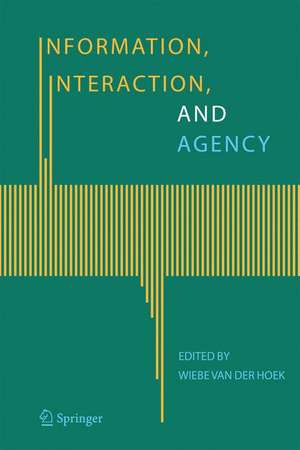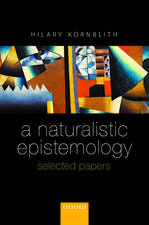Information, Interaction, and Agency
Editat de Wiebe van der Hoeken Limba Engleză Paperback – 22 iul 2005
Agents perform actions based on the available information and in the presence of other interacting agents. From this perspective Information, Interaction, and Agency neatly ties together classical themes like rationality, decision-making and belief revision with games, strategies and learning in a multi-agent setting.
Unified by the central notions Information, Interaction, and Agency, the essays in this volume provide refreshing methodological perspectives on belief revision, dynamic epistemic logic, von Neumann games, and evolutionary game theory; all of which in turn are central approaches to understanding our own rationality and that of other agents.
Preț: 391.40 lei
Nou
Puncte Express: 587
Preț estimativ în valută:
74.93€ • 77.10$ • 63.16£
74.93€ • 77.10$ • 63.16£
Carte tipărită la comandă
Livrare economică 28 februarie-14 martie
Preluare comenzi: 021 569.72.76
Specificații
ISBN-13: 9781402036002
ISBN-10: 1402036000
Pagini: 352
Ilustrații: XVI, 334 p.
Dimensiuni: 155 x 235 x 20 mm
Greutate: 0.49 kg
Ediția:2005
Editura: SPRINGER NETHERLANDS
Colecția Springer
Locul publicării:Dordrecht, Netherlands
ISBN-10: 1402036000
Pagini: 352
Ilustrații: XVI, 334 p.
Dimensiuni: 155 x 235 x 20 mm
Greutate: 0.49 kg
Ediția:2005
Editura: SPRINGER NETHERLANDS
Colecția Springer
Locul publicării:Dordrecht, Netherlands
Public țintă
ResearchCuprins
Logics for Epistemic Programs.- A Counterexample to Six Fundamental Principles of Belief Formation.- Comparing Semantics of Logics for Multi-Agent Systems.- A Characterization of Von Neumann Games in Terms of Memory.- An Evolutionary Game Theoretic Perspective on Learning in Mult-Agent Systems.- Evolution of Conventional Meaning and Conversational Principles.- Nonmonotonic Inferences and Neural Networks.- A Model of Jury Decisions Where All Jurors Have the Same Evidence.- A Sat-Based Approach to Unbounded Model Checking for Alternating-Time Temporal Epistemic Logic.- Update Semantics of Security Protocols.
Caracteristici
Goes across 'classical' borderlines of disciplines Unifies logic, game theory, epistemics and studies in multi-agent systems Combination of classical and novel approaches to information, interaction and agency
















